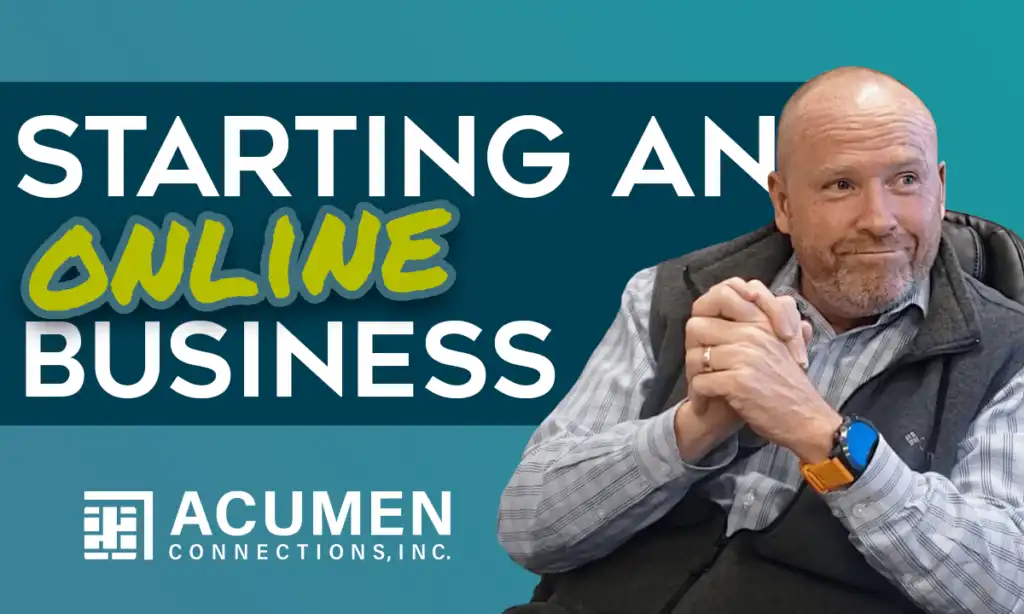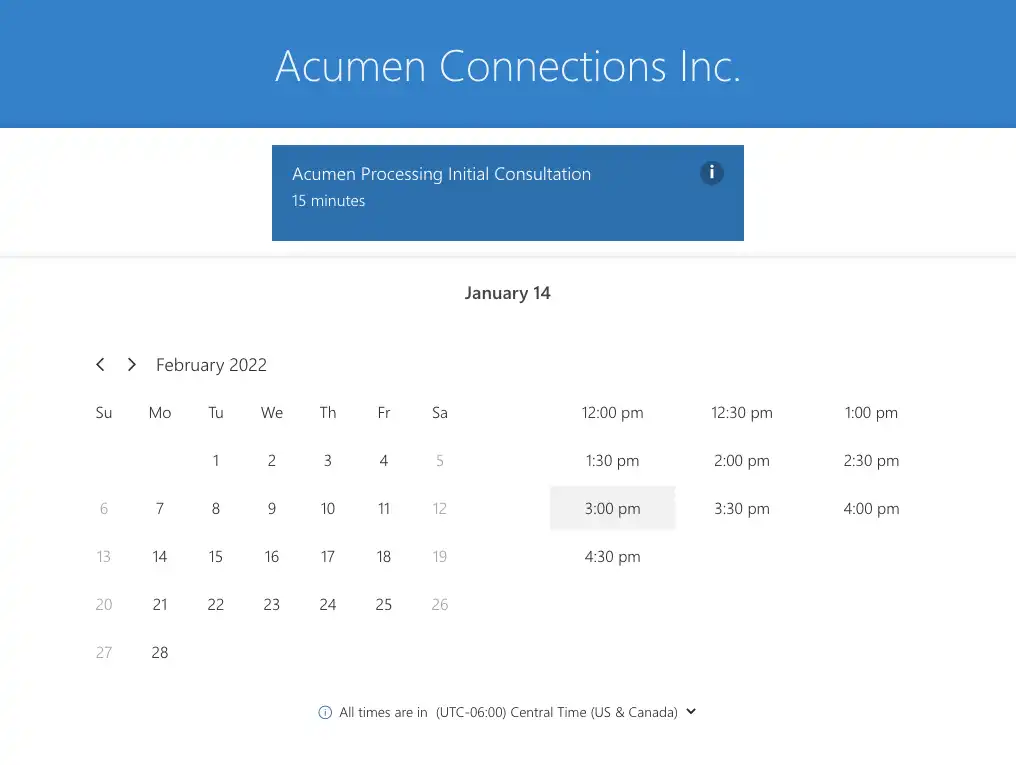20 Steps to Start an Online Business
Starting a business isn’t the easiest of tasks, but with the right intent, passion, and resources, it can be accomplished. In this piece, we will show you how to start an online business in a few simple steps. The best part is that we have insights from a successful entrepreneur.
If you’ve seriously considered starting an online business, there is a plethora of things you need to get started. The good news is that it is never too late to begin, and we’ll be here the entire time with helpful tips and tricks that you can use to your benefit while starting and growing your new company.
When we try to offer business advice, we bring out the big guy. Brian Staver is an entrepreneur at heart, and the CEO of Acumen Connections. He has founded multiple businesses and has some compelling advice for new entrepreneurs.
Watch Brian’s full interview here:

Why start an online business?
Brian explains the value of starting an online business,
“An online business allows you to reach the world from one location. This is very intriguing that you can make one little change on your website and the whole world can see. Online has a larger reach than traditional brick and mortar businesses. You’re able to reach a broader market at a much faster rate. There’s less overhead and less expense.”
At Acumen Connections, we strive to help companies achieve their business goals year after year. Today, we wanted to discuss the process of starting an online organization in a way that is easy to understand. Here are 22 steps you should take in order to start a business:
How to start an online business
1. Consider the pros and cons of your business
Analyze your product and business idea to determine if it is a potentially successful opportunity. Calculate your breakeven point to know how much you will need to sell in order for the revenue to at least cover the costs.
Identify a strong target market that would likely be incredibly interested in spending that amount of money on your product or service. Compare the tactics of other companies in your industry and identify your competitive advantage.
2. Develop your business strategy
Fine-tune your idea and create a more concrete business plan that will act as a blueprint for your company. You’ll need to create a profit/loss forecast at this time. If you do not know how, Nolo has a great article on how to create one.
You will need to obtain capital and cover the high starting costs, so you should start searching for start-up financing.
A few popular ways to fund your start-up are:
- Personal savings
- Bank loans
- Friends and family
- Crowdfunding
- Venture capital
- Investors
- Small Business Administration loans
3. Research your market
This is vital as you need to refine your plan based off both your defined target market and what is financially affordable. Identifying your target market means outlining the “why” behind your product or business, what problem this solves and who is affected by that problem.
You need to figure out who your audience will be before you just start marketing or else you may not be using the appropriate dialogue and could be wasting marketing dollars on the wrong audience or channel.
Luckily, you have a friend in Acumen Connections; our blog contains a lot of information and articles on marketing your business at any step of the way. Additionally, we love to partner with our merchants to produce and share content about their business. Get in touch with us to collaborate, today!
Here are some of our most popular marketing-focused articles:
4. Pick a business name
There are a few resources to check before settling on a business name, to ensure that it is not already in use. Check to see if an applicable website domain is currently available online for your company’s website. Confirm with your county clerk’s office that the name has not been taken. Then contact the Secretary of State to confirm the same thing. Finally, you will want to check with the United States Patent and Trademark Office website to see if there is a federal or state trademark already on the potential name.
You will need to register your online business just like any other enterprise. We recommend using a service such as LegalZoom to take care of registration. Purchase the web address domain name that you want for the company’s website.
Pro tip: We strongly recommend doublechecking your spelling during every step of this process!
5. Decide on your business’s legal structure
Get started by identifying who the owners are, how much personal liability protection you will need, how you want the organization to be taxed, and if you want to be able to sell stock.
The major types of business structures are:
- Sole proprietorship
These are owned and managed by a single person. The business and the owner are treated as one entity. - Partnership
These are businesses owned and run by two or more people. Both partners are required to pay taxes on their share of income earned. - LLC
LLCs or Limited Liability Companies offer the advantage of limited personal liability of the owners regarding business debts or legal charges against the business. - Corporation
These are independent entities, separate from the people who own or manage it, for all legal and tax purposes. - Nonprofit
Organizations that are generally exempt from federal or state taxes as they are formed to carry out charitable, humanitarian, educational, cultural, or religious functions. - Cooperative
They are organizations that are owned and run with the purpose of benefiting the members who avail its services. One can usually become a member by buying shares.
Pages could be written about all the details regarding different types of ownership structures that exist, so we will just refer you to this great list, instead.
6. Seek legal counsel
A lawyer’s professional help could be invaluable as you start building your online business. Catch them up to speed on your business plans and explain which legal structure you think is best for you and your company and why.
A professional lawyer is worth the investment and will make sure that you are taking all the correct steps legally to start and operate. The Balance has a great article on when you might and might not need a lawyer while starting up your business.
Do not be afraid to talk to the paralegal or legal assistant because although they may not be able to provide the same level of support or service, they will likely know more about your organization and current situation than your lawyer will.
7. Prepare the necessary paperwork
To bring the start up to life, you need the essential paperwork. This is likely where your attorney will need to help. You might be able to file some things on your own, like the articles of organization for an LLC, or a few online documents. However, you might need legal help with things like incorporation forms and documents, or other papers.
A few popular choices for legal help are:
- LegalSheild
- LegalMatch
- John Barrett (Goddard, Kansas)
8. Calculate your needs and expenses
Determine how much rent you can realistically afford for your business and identify which fixtures and features your company will need for the manufacturing process or the shipping function. Since your business is online, you don’t have to worry about finding a shop space.
Depending on how big your company is, or what your product is, you may not even need office space.
9. Tie up loose ends
Finish-up the rest of the necessary paperwork to open your business. Acquire the tax IDs, licenses, and permits that are relevant to your organization. Now is the time to set up your business bank accounts, too.
10. Insurance is important!
You need insurance for your business. Before you start conducting business, you will want to obtain insurance such as liability insurance, product liability insurance, health insurance, disability insurance etc. Some of these will help protect your company’s assets and belongings while others will protect you, your family, your future employees, and their families.
11. Determine your company’s financial system
There is a chance that this step and the next step will ultimately be completed simultaneously. You need to identify when your fiscal year starts and how you plan to record accounts payable and accounts receivable.
Additionally, you have to choose which system of accounting you plan to use. The main types of accounting systems are:
- Single Entry System:
In this system, you can record every transaction as a line item in a ledger. - Double Entry System:
In this system, you can record every transaction as a debit and credit in separate accounts.
12. Accounting and bookkeeping
Invest in small business accounting software or hire a full-time or part-time bookkeeper or accountant depending on your company’s needs as well as your own personal needs.
We’ve often heard phrases like “numbers matter” or “look at the numbers”. We asked Brian to explain what it means to focus on the numbers.
He responded, “As you grow your business, you need to know where you’re going, what you’ve done, and what to do next. The only way to know any of that is to have numbers and accountability for everything that you’re doing. You have to know your numbers to pay employees, vendors, and take care of other expenses.”
When probed if some numbers are more important than others, this is what Brian had to say:
“It depends on your business but your top-line and bottom-line are important. Your topline means your revenue – what you’re generating in sales. Bottom-line is what is left over or what you’re making in profit, your net income at the end of the day. What you have left over is what you’re making in your business.”
So, when it comes to numbers, Brian believes that you need to start with your top-line and bottom-line which are your revenue and net income respectively. After that, anything you’re monitoring in your company is going to be in support of that. You could monitor the number of units sold, number of defects, expenses, prices of commodities etc. Ideally, you want your topline and bottom line to grow at similar rates. If your current revenue isn’t covering your expenses in a way to produce a positive net income, it’s time to review and potentially cut expenses or find a way to increase revenue without increasing expenses at the same rate.
13. Pay attention to taxes
Familiarize yourself with the general tax scheme for your business structure and start saving onto the paperwork that you and your organization will require for tax season the following year. For small businesses, we have a tax preparation checklist that could prove to be extremely helpful.
14. Expert opinions can help
Once you start making some sales, hire a designer to help you make a website, logo, or advertising material for your company. If you are unsure how this process looks, we have two great articles on the topic: How To Design A Logo and Why You Should Work With A Logo Designer.
15. Decide how you wish to handle payments
The next step is determining payment processing for your company. Receiving cash revenue is great in theory. However, if you’re opening an online business, customers likely will prefer to not mail in cash or check payment. This is where digital transactions can help.
With an online business, you’ll want a payment gateway to accept payments online. Customers will be able to shop and purchase directly from your website.
With a payment gateway, you’ll be able to accept debit cards, credit cards, and gift cards to accept digital payments or set up recurring payments such as monthly invoices. With a POS system, you’ll be able to accept customer card information over the phone.
With an online business, you will be able to accept payments from more than just your immediate neighbors. Who knows? You could have customers all around the country, or even the world!
Need help getting set up with a payment gateway or POS system? Acumen Connections can help. Schedule a call with us today. We’ll discuss your needs and find the solution for your business.

Start your risk-free trial. No commitment!
Best of all, we’re experts at saving businesses money on payment processing!
16. Establish an online presence
This includes building a website, claiming your google business listing, and setting up social media. Let’s break it down for you.
When operating online, your website acts as your store front. You need to build a high-converting website in order to get leads and generate sales.
Leverage social media to build brand recognition and engage with your prospects. Discover how social media marketing can help your business.
- Social Media Presence Pays
- Social Media In the 21st Century
- Social Media Tips
- Reaching New Customers Through Your Facebook Business Page
17. Build a team
You will need to start hiring some of your team. As much as you may want to be in control of every aspect of your company, you will eventually need to hire help.
Brian makes an excellent point when asked when a good time is to hire experts and delegate duties instead of being a one-person army.
He says that at the start of running your business, you might be performing every function. You’ll have to wear a lot of hats and manage accounting, marketing, sales, operations, and more.
When asked how he determines when it’s time to hire someone new, Brian had this to say, “You’re kind of going to know [when]. You’re going to start doing things that are outside of your comfort zone… It’s time now for someone else to do this. I’ve got the capital I can hire somebody…”
Brian recommends hiring experts in fields you don’t have as much experience. Employing an expert to do a task will actually propel your business and makes you even more money.
He clarifies that the decision to hire someone new shouldn’t just be on the idea that you have the capital to hire someone. Instead, Brian suggests, “You don’t hire someone to break even on what you’re paying them. They have to bring in more than what they’re getting paid in order for the company to keep growing.
When it comes to recruiting and Human Resources, we have multiple helpful articles on the subject:
- List of Great Interview Questions
- Why Diversity Is Beneficial To Your Team
- Why Employee Retention Is Essential
- How To Communicate With Your Team
18. Business development and growth
To improve your sales, you will need to create a great rapport with current customers. Word-of-mouth is still the best marketing for any company, and it only happens if you are able to actually help your clients and exceed their expectations. We have advice both on how to retain your current customers and how to help disgruntled customers. Remember to continuously get feedback from your shoppers, as they will be the most resourceful in helping you figure out what needs fixing.
We asked Brian what his biggest challenge in business was and how he overcame it. He replied,
“The biggest challenge is knowing what’s the right answer or solution. You’re rarely ever 100% confident that you’re making the right move. When should I open a business? When should I start? What’s the next step?”
He clarifies, “Fear can hold a person back. I had 160 thousand units of product stopped by customs… I had to go around and rework all of those products in the US. When you run into issues, you have to keep moving. Don’t get weighed down by your worries from moving forward. Take action. Don’t dwell on things.”
19. Spread the word!
Finally, tell everyone you know about how your experience with Acumen Connections has been and how helpful we were throughout every step of the way. By working together, Acumen Connections will help you and your team find the right business solutions based on your business needs.
20. Be ready to face challenges
Every business venture comes with its unique set of hurdles and challenges. It is necessary for entrepreneurs to be prepared to face them. There are so many factors that can contribute to a challenge. There are market fluctuations, employee issues, competitors, and more. It takes determination and strategy to overcome obstacles. We share new content each week, from industry experts. In fact, Brian has some advice for any new entrepreneurs:
“Watch your numbers. Be persistent. Don’t let your down days get you down; Work through them. Believe in your product. Take care of your customers and take care of your employees. Don’t take things for granted. Be accountable. Always look for improvement.”
Starting a business may seem complex and tortuous at first. Hopefully with the help of this guide and a little bit of research, you should find that it is not as intricate of a process as it seems. It is important to remember that there is no reason to be afraid to ask for help or try something new, because every single successful business owner has been exactly where you are, now. Learn from both success stories and stories of failure, since there is truth to be found in either situation.
Anna Reeve, MBA


